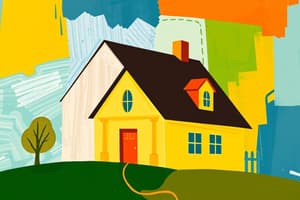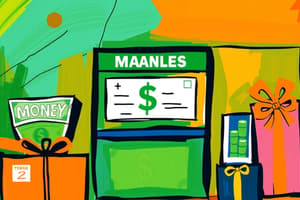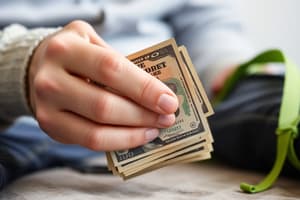Podcast
Questions and Answers
What motivated Mark Boyle to stop buying things?
What motivated Mark Boyle to stop buying things?
- He wanted to invest in organic farming.
- He was concerned about environmental damage and overconsumption. (correct)
- He aimed to promote his organic food company.
- He wanted to save money for a new house.
What was Boyle's living arrangement after selling his houseboat?
What was Boyle's living arrangement after selling his houseboat?
- He rented an apartment in Bristol.
- He lived in an old mobile home on a farm. (correct)
- He moved into an affordable shared house.
- He stayed with friends in the area.
How did Boyle manage to heat his old mobile home?
How did Boyle manage to heat his old mobile home?
- He collected heating oil from neighbors.
- He burned wood from the forest. (correct)
- He used electric heaters.
- He used solar panels.
Which of the following activities was NOT part of Boyle's lifestyle during his experiment?
Which of the following activities was NOT part of Boyle's lifestyle during his experiment?
What did Boyle do after completing his experiment of living without buying anything?
What did Boyle do after completing his experiment of living without buying anything?
Flashcards
Boyle's Experiment
Boyle's Experiment
Mark Boyle's year-long attempt to live without purchasing anything.
Reducing Consumption
Reducing Consumption
Boyle's concern about the amount of waste and unnecessary purchases.
Sustainable Living
Sustainable Living
A way of living to minimize negative impact on the environment by reducing waste.
Free Housing
Free Housing
Signup and view all the flashcards
Resourcefulness
Resourcefulness
Signup and view all the flashcards
Study Notes
Mark Boyle's Experiment
- Mark Boyle, a successful Irish organic food company manager, felt concerned about environmental damage and overconsumption.
- He decided to live for a year without purchasing anything.
- He sold his houseboat and moved into a free mobile home on a farm near Bristol, England.
- He worked on the farm in exchange for accommodation.
- He used methods to minimize expenses, including collecting firewood for heating and growing his own food including finding food in supermarket waste bins.
- He also created his own cleaning products (e.g., toothpaste from fish bones and seeds, soap from nuts).
- He hand-built his own toilet and used old newspapers for toilet paper.
- This lifestyle change profoundly impacted his well-being, making him feel healthier, happier, and closer to nature.
- After 18 months, he resumed using money.
- He documented his experience in two books and used the proceeds to establish "The Free House," a money-free farm in Ireland.
Studying That Suits You
Use AI to generate personalized quizzes and flashcards to suit your learning preferences.





